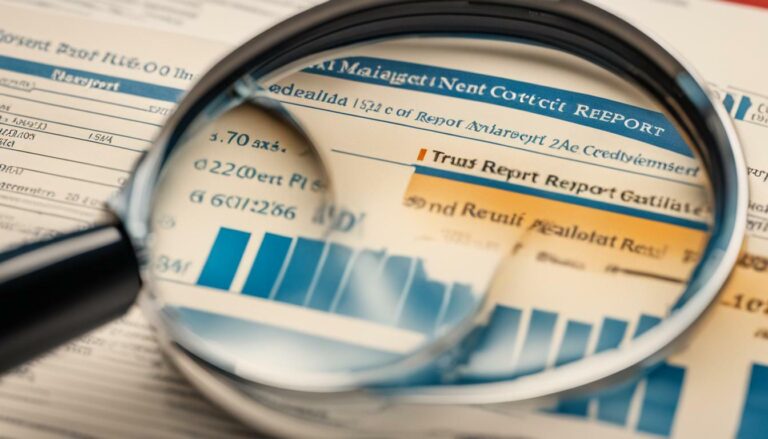How Long Does a Repossession Stay on Your Credit Report?

A repossession can have a significant impact on your credit report and stay there for a specific period of time. It’s important to understand how long this negative mark can affect your creditworthiness.
Key Takeaways:
- A repossession can stay on your credit report for up to seven years.
- Missing car payments and defaulting on your auto loan can lead to repossession.
- A repossession can also result in the loan going into collections, further damaging your credit.
- To avoid repossession, you can negotiate a payment plan, sell the car yourself, voluntarily surrender the car, or find cheaper transportation.
- After a repossession, you can work on improving your credit by reclaiming your financial health, making timely payments, not using all of your available credit, and disputing any credit report errors.
Understanding the Impact of Repossession on Your Credit Score
When a repossession occurs, it can have a negative impact on your credit score and stay on your credit history for years. This can make it difficult to secure new loans or credit cards in the future, and even if you are approved, you may be subject to higher interest rates and less favorable terms. It is important to understand how repossession affects your credit so that you can take steps to mitigate the damage and improve your creditworthiness.
One key aspect of the impact of repossession on your credit score is the decrease in your overall creditworthiness. Your credit score is a numerical representation of your creditworthiness, with higher scores indicating a lower risk for lenders. When a repossession is reported on your credit history, it signals to lenders that you were unable to fulfill your financial obligations, making you a higher-risk borrower. As a result, your credit score may drop significantly, and it may take several years of responsible credit management to rebuild it.
In addition to the negative impact on your credit score, repossession can also affect your credit history. Your credit history is a detailed record of your past financial behavior, including your payment history, outstanding debts, and any derogatory marks such as repossession or bankruptcy. Having a repossession on your credit history can make it more challenging to obtain credit in the future, as lenders may view you as a riskier borrower. It is important to note that a repossession can stay on your credit history for up to seven years, further emphasizing the long-lasting impact it can have on your financial reputation.
To minimize the impact of repossession on your credit score and history, it is crucial to take proactive steps. This can include negotiating a payment plan with your lender to catch up on missed payments or seeking alternative transportation options to avoid defaulting on your auto loan. Additionally, you can work on rebuilding your credit by reclaiming your financial health, making timely payments on all your credit accounts, not utilizing all of your available credit, and disputing any errors on your credit report. By demonstrating responsible financial behavior over time, you can gradually rebuild your credit and improve your creditworthiness.
🚨 TUIC Errors + Low Credit Score?
CreditScoreIQ helps you build credit faster by reporting utility bills to all 3 bureaus—while you dispute errors.
Start Building Credit Today →| Key Takeaways |
|---|
| A repossession can stay on your credit report for up to seven years |
| Repossession can negatively impact your credit score and credit history |
| To minimize the impact, negotiate payment plans, seek alternative transportation, and focus on responsible credit management |
Timeline for Repossession on Your Credit Report
The timeline for a repossession to appear on your credit report is regulated by specific laws and can vary depending on certain factors. In general, a repossession can stay on your credit report for up to seven years. This means that potential lenders and creditors will be able to see this negative mark on your credit history, making it more challenging for you to obtain credit in the future.
When a repossession occurs, it is typically reported by the lender or creditor to the credit bureaus. The credit bureaus then update your credit report to reflect this event, which can significantly impact your credit score. It is important to note that the repossession itself, as well as any missed car payments leading up to it, can have a negative effect on your credit score.
If you find yourself facing the possibility of repossession, it is crucial to take action as soon as possible. You have several options to consider, including negotiating a payment plan with the lender, selling the car yourself to pay off the remaining balance, voluntarily surrendering the car, or finding alternative transportation options. By taking proactive measures, you may be able to avoid repossession and minimize the negative impact on your credit report.
| Options to Avoid Repossession |
|---|
| Negotiate a payment plan with the lender |
| Sell the car yourself to pay off the remaining balance |
| Voluntarily surrender the car |
| Find cheaper transportation |
If repossession does occur and it is reported on your credit report, there are steps you can take to start rebuilding your credit. Begin by focusing on reclaiming your financial health. This includes creating a budget, reducing unnecessary expenses, and saving money. Making timely payments on your other credit obligations is also essential as it demonstrates financial responsibility.
Additionally, it is important to be mindful of your credit utilization. Using all of your available credit can negatively impact your credit score. Aim to keep your credit utilization ratio below 30% by only using a portion of your available credit. Finally, review your credit report regularly for any errors or inaccuracies. If you discover any, dispute them with the credit bureaus to ensure your credit report reflects accurate information.
Managing the Impact of Repossession on Your Creditworthiness
If you’ve experienced a repossession, there are steps you can take to manage its impact on your creditworthiness and improve your credit score. A repossession can stay on your credit report for up to seven years, so it’s crucial to take action to minimize the long-term effects. Here are some strategies to consider:
- Negotiate a payment plan: Reach out to your lender and explain your situation. They may be willing to work with you to create a payment plan that allows you to catch up on missed payments and avoid further damage to your credit.
- Sell the car yourself: If you’re unable to afford the car payments, consider selling the vehicle privately. This can help you pay off your loan and prevent repossession.
- Voluntarily surrender the car: If selling the car isn’t an option, you can choose to voluntarily surrender it to your lender. While this doesn’t eliminate the negative impact on your credit, it shows responsibility and may be viewed more favorably by lenders in the future.
- Find cheaper transportation: If you can’t afford your current car, consider exploring alternative transportation options. This could include public transportation, carpooling, or purchasing a more affordable vehicle. By finding a more manageable solution, you can avoid future financial difficulties and protect your credit.
After a repossession, it’s essential to focus on rebuilding your credit. Start by reclaiming your financial health. Create a budget, prioritize your expenses, and pay your bills on time. Develop a strategy to manage your debts and avoid taking on new credit unless necessary. By demonstrating responsible financial behavior over time, you can gradually improve your credit score.
In addition, be mindful of your credit utilization. Keep your credit card balances low and avoid maxing out your available credit. Aim to use less than 30% of your credit limit to show lenders that you can manage your debts responsibly.
If you believe there are errors on your credit report related to the repossession, it’s important to address them. Dispute any inaccurate information with the credit bureaus to ensure that your credit report is as accurate as possible.
| Effect | How to Minimize |
|---|---|
| Repossession on Credit Report | Take steps to negotiate a payment plan, sell the car, or voluntarily surrender it to your lender. |
| Missed Car Payments | Pay your bills on time and focus on reclaiming your financial health. |
| Defaulted Auto Loan | Manage your debts responsibly and avoid taking on new credit unless necessary. |
| Repossession Impact on FICO Score | Keep your credit card balances low and dispute any inaccurate information on your credit report. |
Rebuilding Your Credit After Repossession
Rebuilding your credit after a repossession requires a proactive approach and taking steps to regain control of your financial situation. The first step is to reclaim your financial health by creating a budget and managing your expenses effectively. This will help you prioritize your payments and ensure that you meet your financial obligations on time.
Additionally, making timely payments is crucial for rebuilding your credit. Paying your bills on time demonstrates your ability to manage your financial responsibilities and can have a positive impact on your credit score. Consider setting up automatic payments or reminders to help you stay organized and avoid late payments.
Another important aspect is to be mindful of your credit utilization. It’s recommended to not use all of your available credit as it can negatively affect your credit score. Aim to keep your credit utilization below 30% to demonstrate responsible credit usage and improve your creditworthiness.
| Tip | Description |
|---|---|
| Reclaim Your Financial Health | Create a budget and prioritize expenses to regain control of your finances. |
| Make Timely Payments | Ensure all your bills are paid on time to demonstrate financial responsibility. |
| Avoid Maxing Out Credit | Keep your credit utilization below 30% to show responsible credit usage. |
If you notice any errors on your credit report related to the repossession, it’s important to dispute them promptly. Mistakes on your credit report can have a significant impact on your credit score. Contact the credit bureaus and provide supporting documentation to rectify any inaccuracies.
Remember, rebuilding your credit after a repossession takes time and patience. Stay committed to your financial goals and take proactive steps to improve your creditworthiness. By following these strategies and maintaining a responsible approach to credit management, you can rebuild your credit over time and regain financial stability.
Summary:
Rebuilding your credit after a repossession requires a proactive approach, including reclaiming your financial health, making timely payments, and not maxing out your available credit. It’s important to dispute any credit report errors promptly to ensure the accuracy of your credit information. Patience and persistence will be crucial as you work towards improving your creditworthiness and regaining control of your financial situation.
As you can see, rebuilding your credit after a repossession is possible. By following these strategies, you can gradually improve your credit score and regain financial stability. Remember, it’s important to stay committed to your financial goals and take proactive steps to manage your credit effectively. With time and responsible credit management, you can overcome the impact of a repossession and rebuild your credit.
Conclusion
Understanding how long a repossession stays on your credit report and taking appropriate actions can help you navigate the challenges and rebuild your credit over time.
A repossession can have a significant impact on your credit score and credit history. It can stay on your credit report for up to seven years, making it harder to secure future loans or obtain favorable interest rates. Missed car payments can lower your credit score, and if you default on your auto loan, it can go into collections, further damaging your credit. When a secured loan like an auto loan goes to collections, the vehicle may be repossessed, which can also stay on your credit report for up to seven years.
If you want to avoid repossession, there are several options available to you. You can negotiate a payment plan with your lender to catch up on missed payments. Alternatively, you can sell the car yourself and use the proceeds to pay off the loan. Another option is to voluntarily surrender the car to the lender, which can help you avoid the costs and hassle of repossession. Finally, you can explore more affordable transportation alternatives that better fit your budget.
After a repossession, it’s important to focus on rebuilding your credit. Start by reclaiming your financial health by creating a budget and managing your expenses wisely. Make timely payments on your existing debts and bills to demonstrate your financial responsibility. It’s also advisable to avoid maxing out your available credit and keep your credit utilization ratio low. Additionally, review your credit report regularly and dispute any errors or inaccuracies that may be negatively impacting your credit score.
Remember, rebuilding your credit takes time and effort. By implementing these strategies and staying committed to responsible financial habits, you can gradually improve your creditworthiness and overcome the impact of a repossession on your credit report.
FAQ
How long does a repossession stay on your credit report?
A repossession can stay on your credit report for up to seven years.
Can missing car payments hurt your credit score?
Yes, missing car payments can hurt your credit score.
What happens if you default on your auto loan?
If you default on your auto loan, it can go into collections, further damaging your credit.
What happens when a secured loan like an auto loan goes into collections?
When a secured loan like an auto loan goes into collections, the vehicle may be repossessed, which can also stay on your credit report for up to seven years.
How can you avoid repossession?
To avoid repossession, you can negotiate a payment plan, sell the car yourself, voluntarily surrender the car, or find cheaper transportation.
What can you do after a repossession to improve your credit?
After a repossession, you can work on improving your credit by reclaiming your financial health, making timely payments, not using all of your available credit, and disputing any credit report errors.
Source Links
- https://www.experian.com/blogs/ask-experian/how-long-for-auto-repossession-to-come-off-credit/
- https://www.experian.com/blogs/ask-experian/how-long-does-voluntary-surrender-or-repossesion-stay-on-credit-report/
- https://www.lendingtree.com/credit-repair/how-a-car-repossession-affects-your-credit/
Ready to Improve Your Credit?
Disputing TUIC errors is step one. Step two? Boost your score by reporting utility payments with CreditScoreIQ.
Get Started Now (Only $1 Trial) →3-bureau reporting • $1M identity insurance • Dark web monitoring




